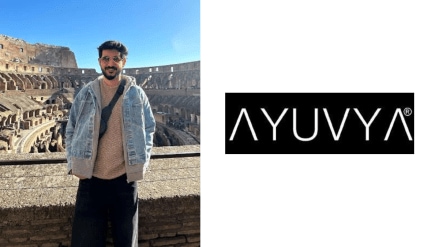The pandemic has brought about notable shifts across industries, and the case has been no different for marketing. Today, digital marketing has become a crucial aspect in order to acquire new customers and retain existing ones. In our weekly BrandWagon Ad Talk series, industry experts highlight what has changed over the past two years and more importantly, are these changes here to stay. Tanishk Pandey, co-founder and CMO, Ayuvya , talks to BrandWagon Online about the dos and don’ts of digital marketing, best marketing campaigns, and more.
1. What is the difference between launching a brand in today’s digital era versus earlier?
In today’s digital age, brands have unprecedented accessibility to a global audience from the outset, overcoming the geographical limitations that once constrained brand launches. Digital platforms facilitate cost-effective brand visibility through social media advertising, influencer marketing, and search engine optimization, in stark contrast to traditional methods that necessitate significant investments in TV, print, or billboards. Furthermore, brand launches are now supported by real-time data analysis from social media, website traffic, and customer feedback, which allows for agile adjustments to marketing campaigns. The demand for engaging and frequent content has risen, transforming brands into storytellers that connect with customers across multiple touchpoints like Instagram, YouTube, and LinkedIn. Additionally, brands can now engage directly with consumers through platforms such as Instagram and WhatsApp, enabling immediate interaction and feedback. In a market where physical retail was historically dominated, e-commerce integration has revolutionized it by allowing for speedier and more flexible product distribution through the creation of direct-to-consumer platforms and digital marketplace launches.
2. What are the recent best marketing or advertising campaigns you have seen and why?
Some notable creative marketing and advertising campaigns have been executed lately, the most effective ones being CRED’s campaigns during the IPL seasons and Zomato’s clever use of pop culture. There have been a couple of great marketing and advertising campaigns lately that stand out for their innovation and how they engage with people, but some of the best are CRED’s IPL campaigns and pop culture utilization by Zomato. CRED IPL campaigns have been distinguished in the market with a mix of humor, nostalgia, and celebrity endorsements that come with a quirky twist and manage to capture attention. With catchy content smartly interlinked with the concept of rewards in clearing credit card dues, CRED ensures meaningful engagement with its audience. On the other hand, Zomato has aced the game of pop culture integration into their social media marketing campaigns. With memes, topical issues, and pertinent cultural references, Zomato remains relevant and relatable, which is a guaranteed approach to developing an immediate emotional bond with one’s audience. Both brands reveal how creativity and cultural awareness can cement marketing strategies, making them remarkable in the competitive landscape while resonating deeply with consumers.
3. Which brand in the last year has made the best use of digital and how?
Today, the competitive marketplace is full of innovative brands using technology and creative marketing strategies to improve customer engagement and drive growth. Lenskart has led in this regard by incorporating AR in its app, where customers can virtually try on glasses. This not only created a seamless shopping experience but also helped to greatly improve engagement during the pandemic when physical stores were largely inaccessible. Similarly, BoAt has won over the attention of the youth, who are keenly interested in technology. It has done so with influencer-driven campaigns and content related to lifestyle and fitness that is consistently delivered in the digital space. Digital presence has been further heightened by user-generated content from social media contests. Additionally, Nykaa has managed to carve out a dominant place in the digital beauty space through influencer marketing, beauty tutorials, and both online and offline shopping experiences. Their digital-first approach, especially during the time of their IPO launch, also drew much attention and highlighted their new strategy in the beauty market.
4. In a post-Covid world, what are the dos and don’ts of digital marketing?
Authenticity remains a prime concern for the brand in this rapidly shifting scenario of digital marketing since today’s consumer wants transparency and corporate social responsibility. Thus, building messages around the problems faced by the people will increase consumer trust and loyalty. Also, personalization plays an equal role in this by using AI and data analytics to provide relevant experiences and recommendations to individual users. The importance of engaging audiences effectively is further underscored by the rise in video content on platforms like TikTok and Instagram reels. Building online communities through social media groups and exclusive content can also be a way to strengthen brand connections.
On the other hand, brands need to avoid overselling since hard selling is never an effective practice in this empathetic market. Customer feedback is usually the worst thing to ignore as it can badly harm relationships, and forgetting mobile optimization will alienate customers who are shopping largely on their mobile phones. Lastly, agility to accommodate the rapidly changing digital trend is essential for a brand to stay relevant and compete in an ever-changing arena.
5. One recent bad case of advertising you have seen, and why?
A recent example of problematic advertising is when Burger King UK tweeted on International Women’s Day stating, “Women belong in the kitchen.” This message gained a lot of negative attention because it was misogynistic in tone, and many people felt that it was trying to be provocative instead of supporting women. It lightheartedly trivializes very important issues of gender inequality in society, diminishing the message of empowerment that International Women’s Day should provide. Later on, Burger King clarified that it is part of an ad campaign to promote female chefs and encourage more women into such careers, but that doesn’t change the immediate initial reaction. This case also brings into perspective the essence of meaningful messaging, especially with sensitive social issues, in which poorly executed attempts at humor might create a public backlash against the brand.
